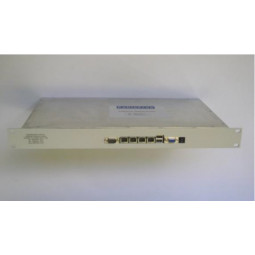CFWiFi-Gigabit-Hotspot-Controller CableFree WiFi Gigabit Hotspot Controller
- Powerful Gigabit Hotspot Controller & Router
- Intended for use in Wireless Excellence wireless networks
- 1U or 2U 19” Rack-mount enclosure versions
- High-power CPU and networking hardware
- Carrier-class RadioOS and resiliency features
- Four PCI-E Gigabit Ethernet Interfaces in base model
- Expansion slots: 2x (1U models) or 4x (2U models)
- Flexible choice of backhaul interfaces
Sophisticated Embedded Software Router Platform
CableFree Gigabit Hotspot Controllers are high quality enterprise-grade routing products. They embody powerful carrier-class router architecture with advanced features not found in low-cost commercial routers. Such features include:
- Choice of CPU from 1 up to 2GHz;
- IP Bridging;
- Layer3 IP Routing;
- Border Gateway Protocol (BGP);
- Ethernet-over-IP (EoIP) interfaces;
- Virtual Router Redundancy Protocol (VRRP);
- WISP & hotspot –specific features including Walled Garden, Cookies, RADIUS authentication, accounting, control of connection time;
- Uplink and downlink bandwidth control on a per-user basis;
- DHCP Client and Server;
- Network Address Translation (NAT); Stateful firewall and NAT;
- Easy DMZ deployment; IPsec, VPN tunnelling (PPTP, L2TP, EoIP, IPIP), VLAN and PPPoE;
- Transparent security: multiple STP bridges with packet filtering; many other features.
Optimised for Broadband Internet and Wireless ISP (WISP) networks
Wireless Excellence Internet Routers offer major advantages over ‘off-the-shelf’ router products. Examples are:
- Many features optimised and designed for WISP environment
- Traffic aggregation, grooming and per-user bandwidth controls
- Virtual Router Redundancy Protocol (VRRP) allows two routers to be configured with one in ‘hot standby’ for high-availability applications Hotspot features including Radius authentication and per-user bandwidth controls
- Stateful firewall and NAT; Easy DMZ deployment; IPsec, VPN tunnelling (PPTP, L2TP, EoIP, IPIP), VLAN and PPPoE; Transparent security: multiple STP bridges with packet filtering;
- HTTP and DNS caching proxy; P2P system limitation (Kazaa, Direct Connect and other protocols)

